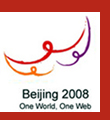Refereed Papers
| Browsers and User Interfaces |
Data Mining |
Industrial Practice and Experience |
| Internet Monetization |
Mobility |
Performance and Scalability |
Rich Media |
Search |
| Security and Privacy |
Semantic / Data Web |
Social Networks and Web 2.0 |
| Technology for Developing Regions |
Web Engineering |
WWW in China |
XML and Web Data |
Developers Track |
Panels |
Posters |
Tutorials |
Workshops
Alternate Track -- WWW in China
Important Dates:
| Submission deadline: |
November 1, 2007 |
|---|---|
| Acceptance notification: |
January 15, 2008 |
This is the first time that the International World Wide Web Conference comes to mainland China. A recent report shows that China has the second largest number (162 millions) of internet users and the number is increasing rapidly. This "WWW in China" alternate track will provide a forum for academics and industry to present and discuss the latest progress of Web technologies in China. The track will also serve as a platform for the world to better understand the internet in China, and for China to listen to the world. The technical program for the three-day track will include refereed paper presentations, panels, and keynote speeches from some of most influential leaders in China's industry and academia.
We solicit original papers describing research in all areas of the Web related to China. In particular we welcome papers that address:
- Challenging issues raised by specific characteristics of the Chinese Web.
- Web phenomena related to Chinese culture, languages, and users.
- Emerging new Web applications and technologies in China.
Submission Guidelines
Paper formatting requirements will be provided on the submissions page.
- Program Committee:
Aoying Zhou (Fudan University, China)
Bing Liu (University of Illinois at Chicago, USA)
Bo Shen (HP Labs, USA)
Chen Li (University of California at Irvine, USA)
Ching-Laung Lei (National Taiwan University, Taiwan)
Cho-li Wang (The University of Hong Kong, Hong Kong)
Dou Shen (Microsoft adCenter Labs, USA)
Hai Jin (Huazhong University of Science and Technology, China)
Hai Zhuge (Chinese Academy of Sciences, China)
Herman Rao (Far Eastone Telecom, Taiwan)
Hong Gao (Harbin Institute of Technology, China)
Hsin-Hsi Chen (National Taiwan University, Taiwan)
Huan Liu (Arizona State University, USA)
Jeffrey Yu (Chinese University of Hong Kong, Hong Kong)
Jian Ma (Nokia, China)
Jian-Yun Nie (University of Montreal, Canada)
Kam-Fai Wong (Chinese University of Hong Kong, Hong Kong)
Lifeng Sun (Tsinghua University, China)
Qiang Yang (Hong Kong University of Science and Technology, Hong Kong)
Qing Li (City University of Hong Kong, Hong Kong)
Shaoping Ma (Tsinghua University, China)
Ting Liu (Harbin Institute of Technology, China)
Weiyi Meng (Binghamton University, USA)
Xiaofang Zhou (University of Queensland, Australia)
Xiaoyong Du (Renmin University, China)
Xing Li (Tsinghua University, China)
Xueqi Cheng (Chinese Academy of Sciences, China)
Yennun Huang (Institute for Information Industry, Taiwan)
Yingshu Li (Georgia State University, USA)
Yong Yu (Shanghai Jiao-Tong University, China)
Yunhao Liu (Hong Kong University of Science and Technology, Hong Kong)
Zaiqing Nie (Microsoft Research Asia, China)
Zhong Su (IBM China Research Lab, China)


.jpg)











